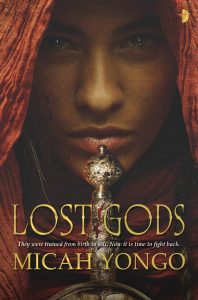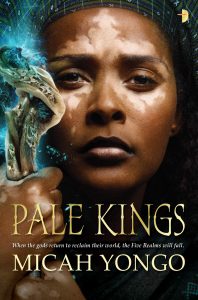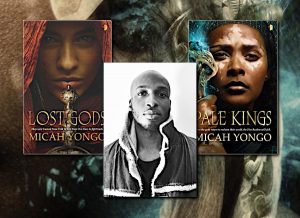Author Spotlight: MICAH YONGO
Joining us for today’s Author Spotlight is Micah Yongo!
Micah Yongo is a UK-based journalist, writer and videographer. When he’s not writing articles he can be found lamenting the often rainy weather in his beloved hometown of Manchester, working on his true passion – fiction writing – or blogging about the varied things that make the world tick, and those who live in it.
Lost Gods is his debut novel. The sequel, Pale Kings, was released earlier this week, and is available now.
Welcome to the Hive, Micah. Let’s start small: tell us about a great book you’ve read recently!
Well, I’ll tell you about two I’m currently reading (I’m notoriously slow) – Thin Air by Richard K. Morgan, and C.A. Fletcher’s A Boy and His Dog at the End of the World – both of which are incredibly immersive. The worlds of each are so vividly and carefully constructed, and in the case of the latter in particular, populated by incredibly colourful and diverse personalities. Thoroughly enjoying both of them so far.
Okay, time to escalate things: reality warps and you suddenly find yourself leading a D&D-style party through a monster-infested dungeon. What character class are you, and what’s your weapon of choice?
Ok, well. I’ve never played or watched D&D so I’m going to be totally ignorant in my response here. But if there’s a mystic/magician/wise old man or woman kinda class then I’d be rolling with that one. Being able to do magical type stuff just doesn’t get old, regardless of the platform – video games, movies, board games, real life etc. The mystics always rock. Oh, and healers. Give me one of those. And if there’s a class that includes both, sign me up.
Sounds like you’d make a great druid, Micah!
 When writing, how do you like to work? (In silence, with music, or serenaded by the damned souls of a thousand dead shrimps? Do you prefer to type or to hand-write? Are you an architect or a gardener? A plotter or a pantser? D’you write in your underwear, or in a deep-sea diver’s suit?) Tell us a little bit about your writing method!
When writing, how do you like to work? (In silence, with music, or serenaded by the damned souls of a thousand dead shrimps? Do you prefer to type or to hand-write? Are you an architect or a gardener? A plotter or a pantser? D’you write in your underwear, or in a deep-sea diver’s suit?) Tell us a little bit about your writing method!
I have a goal of one day being able to wake up and write in a full batman suit. Just because. In the meantime, fitting the writing around the day job makes that particular life goal somewhat of a pipe dream for now, but I’ll get there. But yeah, I type, often to wordless music – electronic and soft synth instrumentals, epic movie scores, classical compositions, occasionally vocal dubstep or drum and bass, or EDM – Olafur Arnalds, Kiasmos, almost anything by Hans Zimmer or Two Steps From Hell etc; the kinda stuff that allows my mind to trip and just space out a little, where I can think without interruption. Or think, but not too much, if that makes sense. Which I guess in a lot of ways mirrors the way I work. See, I’m finding that I’m somewhat of a hybrid when it comes to my approach to plotting – halfway between planner and pantser; architect and gardener, I guess. Which, I think, I’m liking at the moment. I started off very much in the gardener/pantser mould with my first novel, Lost Gods, which although can be really useful in how it allows you to at least partly occupy the headspace of a reader as you work, is also pretty stressful when it comes to managing things like deadlines. So now I liken my approach to creating stories to that of driving with a satnav – I’m aware of most of the turns and details as they arrive, whilst also having an overarching awareness of the main destinations I’m trying to work toward. I think in a way working on Pale Kings felt like an exercise in learning to balance the best of both of those worlds.
What (or who) are your most significant fantasy influences? Are there any creators whom you dream of working with someday?
Most significant influences… I’d probably have to say Octavia Butler. I think her work was the first to teach me how more ‘literary’ themes could be introduced to explore ideas in fantasy. Which, to me, is a big part of what the genre has always been about; an extension, in many ways, of the function that myths used to occupy in our societies way back when – a way to orient ourselves in the world, to make sense of it, and ourselves too. And hopefully be thoroughly entertained as part of the deal. But outside of Butler, as much as I love fantasy I’d probably say the majority of my influences are beyond the borders of what we might think of as traditional fantasy literature – David Foster Wallace, Mary Shelley’s Frankenstein, and then filmmakers like Denis Villeneuve, David Lynch, Guillermo Del Toro, Christopher Nolan. And even artists such as Joshua Mays. Of that bunch, if there was one I’d dream of collaborating with it’d probably be Guillermo Del Toro, just for the conversations more than anything. Fascinating dude.
What was the last thing you watched on TV and why did you choose to watch it? Alternatively, what games have you enjoyed recently?
The final episode of the second season of Killing Eve, which I love. Jodie Comer’s character, and her acting, are simply magnetic. So much fun to watch.
The world shifts, and you find yourself with an extra day on your hands during which you’re not allowed to write. How do you choose to spend the day?
More than likely listening to podcasts all day, or bingeing on Netflix, depending on where I am on my mood-spectrum of productive to indulgent that particular day. Alternatively, I’d spend it reading of course.
Can you tell us a little something about your current work(s) in progress?
Ooh, can I? I’m not sure. My agent tells me to keep these things secret. But seeing as it’s just between us – African fantasy. Female protagonist. There’s magic. And spiritual stuff. And fighting. Lots of fighting.
Nice! What’s the most (and/or least) helpful piece of writing advice you’ve ever received?
Probably the most helpful was a quote I read from the American literary author and essayist, John Updike, who once said: “We write by faith.” Or words to that effect, i.e. it’s not only okay to lean into the not knowing, the dauntingness of a blank page, it’s actually good. Noble, even. Trusting that you will discover what you’re writing through the actual process of writing it is a positive thing, a way the work will get done, and perhaps even how your best work will get done. Intuitively, I think I’ve always felt it’s good to allow room, as the writer, to be surprised by the characters, world and/or story you’re writing. For it to be allowed space to be… well… alive, to a certain extent.
 Another really good piece of advice that’s far more prosaic and practical but just as useful, is read. Read widely. And read as much as possible. I wouldn’t know who to attribute that advice to though as I’ve heard it from so many people now. It’s common advice, but very good advice, so I’ll join their chorus and share it too.
Another really good piece of advice that’s far more prosaic and practical but just as useful, is read. Read widely. And read as much as possible. I wouldn’t know who to attribute that advice to though as I’ve heard it from so many people now. It’s common advice, but very good advice, so I’ll join their chorus and share it too.
As for the worst piece of advice… at the risk of appearing slightly controversial, and maybe even hypocritical, seeing as this too is a commonly shared axiom, but… ‘write what you know’. I dunno, I’ve just never liked that idea as a rule. I think the point of creating worlds and stories, especially fantastical ones, is learning how to inhabit an experience or context that’s different from your own, and doing so fully enough to render it authentically, and in a way that the reader finds compelling, or resonant. I think, in that way, that the very best writing ultimately comes out of empathy, connecting with something or someone outside of yourself in a deep or full enough way to make your expression of it real, and worth reading. So yeah, although what we write is almost always informed by what we know, I do think that if we were to stick to only writing what we know as a rule we’d be excused from stretching our imaginations to accommodate the experiences of those who are different from ourselves. Which, I dunno, has always struck me as not all that cool.
Every writer encounters stumbling blocks, be it a difficult chapter, challenging subject matter or just starting a new project. How do you motivate yourself on days when you don’t want to write?
You know, to be honest, I don’t. Don’t get me wrong, I used to try. Like really try. I mean, it was so easy for me to start feeling guilty or unproductive on those days I didn’t write… and then one day I realised that actually, in a way, I’m always writing. Even when I’m away from the page, or keyboard. My brain doesn’t ever shut off from gathering and collating observations and data and annotating experiences so that they can be poured, consciously or unconsciously, into whatever project I’m working on. Part of me is even starting to feel like the majority of my ‘writing’ happens when I’m doing other stuff. I think since waking up to that reality – and I’m not wholly sure of the exact point when that happened, other than to say it was during the writing of Pale Kings – I began to recognise that I could go a day or two, or even three, without writing, and then end up having an unplanned two-day burst with a ridiculously high word count that I’d have never anticipated. It’s perhaps a weird rhythm that I have from time to time but I’ve learned to just go with it, and trust that, for me, it will all average out, and that I’ll be a lot more productive when I don’t try to force myself to be.
So yeah, it’s different for everyone of course, but on days when I genuinely don’t want or feel able to write, I’ll often go do something else, and then return to the manuscript a day or so later feeling refreshed and ready to work. Which, granted, takes a bit of trust. But like Updike said, “we write by faith”.
If you could visit any country at any point in history, where/when would you go, and why?
Oh maaaan, I only get to choose one? Ok, well it would have to be a toss-up between ancient Mesoamerica, say 900BC or earlier, to check out the Omlec civilisation, and figure out how a culture in that time period was able to make the things they did; those huge Omlec heads in particular (which have ended up providing partial inspiration for some of the stuff in Pale Kings). In that vein, I’ve gotta mention ancient Egypt too. I mean, the pyramids… How? Building those things today, even with the incredible technologies at our disposal, would be a problem. So, the fact they managed to do it then, and often with tonne weight stones cut from quarries tens of miles from the building site, not to mention the precision with which they were built, the way their positioning corresponds to the stars etc… I mean, there’s several mysteries about that whole thing I’d love to learn answers too (mysteries which, again, have provided partial inspiration for some of the stuff in Pale Kings). And don’t get me started on all those missing noses on the sphinxes. Thirdly, 18th century Benin, to witness the Dahomey Amazons, an all-female branch of the nation’s military that’s said to have provided the inspiration for the Dora Milaje in the Black Panther comics. Any one of those times and places would be incredible to check out. I think I’d have to flip a coin to decide.
Tell us about a book that’s excellent, but underappreciated or obscure.
Hmm, well, not a book exactly but I’ll go with an ancient Mesopotamian creation myth known as The Epic of Gilgamesh, which, considering how long ago it was put together, is a surprisingly compelling read. Or, totally non-fantasy related, Chinua Achebe’s The Education of a British Protected Child, which is a collection of essays from the Nigerian author/poet/academic, exploring his relationship with the African continent and the various assaults that have been committed (and omitted) against it. A very powerful read.
Finally, would you be so kind as to dazzle us with an elevator pitch? Why should readers check out your work?
Well, doing so is good karma, I promise… ok, just kidding. You shouldn’t trust me. Come to think of it, when you read my stories you shouldn’t trust anyone in them. Deep and rich worlds full of mysteries, action, intrigue, betrayal, assassins, wars and so forth, but very few characters in them who are what they seem. So, take my advice – trust no one; question everything.
Brilliant! Thanks for joining us, Micah, and good luck with PALE KINGS’ release!
Micah Yongo is the author of LOST GODS and PALE KINGS, both available now.

